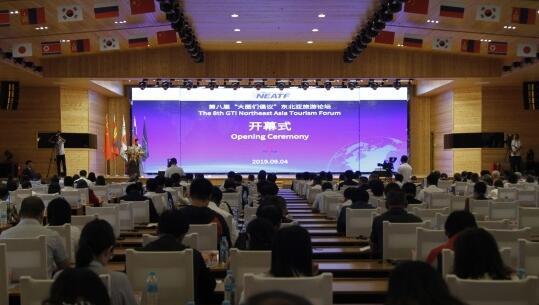CHANGCHUN, Sept. 11 (Xinhua) -- Tourism is a breakthrough point for in-depth implementation of the Greater Tumen Initiative (GTI), an intergovernmental cooperation mechanism among China, Mongolia, Republic of Korea (ROK) and Russian Federation, according to attendees at the recent 8th GTI Northeast Asia Tourism Forum in Hunchun city, Jilin Province.
Zhang Jifeng, mayor of Hunchun, said that as a frontier window of China's opening-up and cooperation towards Northeast Asia, Hunchun is the intersection of the Belt and Road Initiative and the "Silk Road on Ice", and also the best place for China and other Northeast Asian countries to deepen development strategies, especially on tourism cooperation.
The Greater Tumen region has a wide variety of tourism products. It is still the strategic objective to facilitate cross-border procedures, provide tourist facilities and services of high standards, and effectively promote the region as a single tourism destination, according to Kim Jaeshin, senior advisor of the GTI Secretariat of the United Nations Development Programme (UNDP).
Some officials and experts at the forum pointed out that the Greater Tumen region has the advantages to promote development of the tourism industry.
Vanessa Satur, manager of Technical Cooperation and Silk Road, UNWTO, argued that there are four opportunities for regional tourism in Northeast Asia, namely, multi-destination tourism, economic strength of major markets, growing investments in tourism-related projects, and high attention of the local government to the tourism.
Countries in Northeast Asia should eye the tourist sources outside the region and build the "transnational tourism towns" and jointly build the brand of "Tumen coast" for international coastal tourism, according to Chen Yao, vice chairman of the Marine Tourism Committee, Pacific Society of China.
At present, there have been still a lot of jobs to be done for better development of the tourism development in the Greater Tumen region.
Gao Shunli, the researcher of Chinese Academy of Social Sciences (CASS), said that the key words of GTI are border, sea area, cooperation and development. It involves different national conditions, social systems, development stages and hot spots of concern between countries. All parties need confidence to seek common ground. (Contributed by Guan Ziru, edited by Hu Pingchao)




 A single purchase
A single purchase









